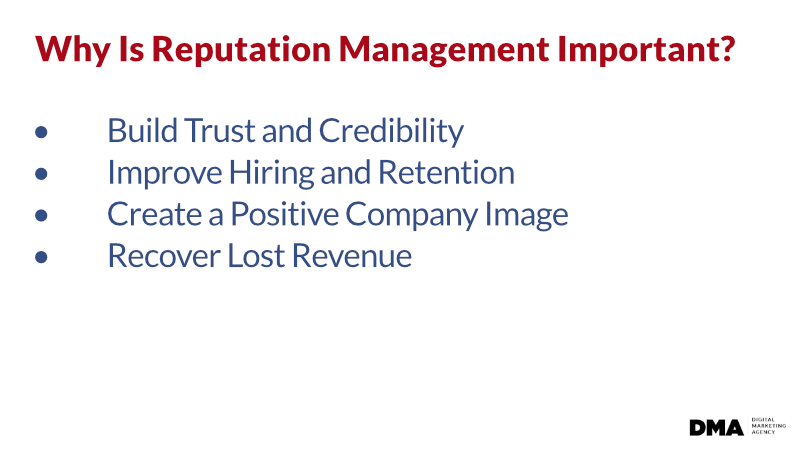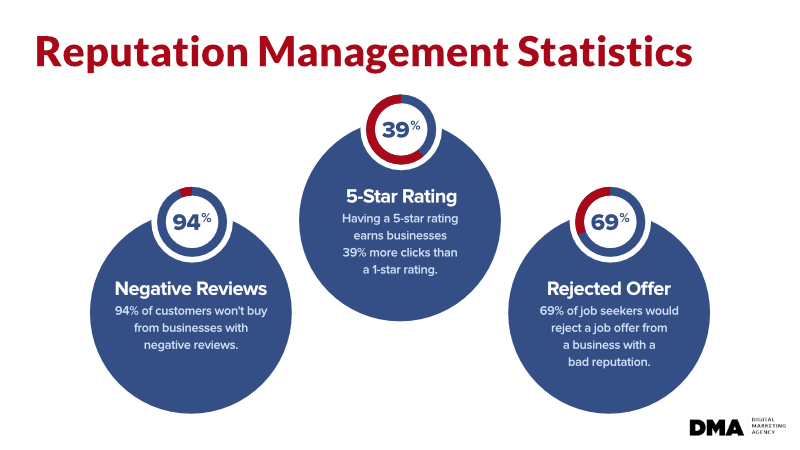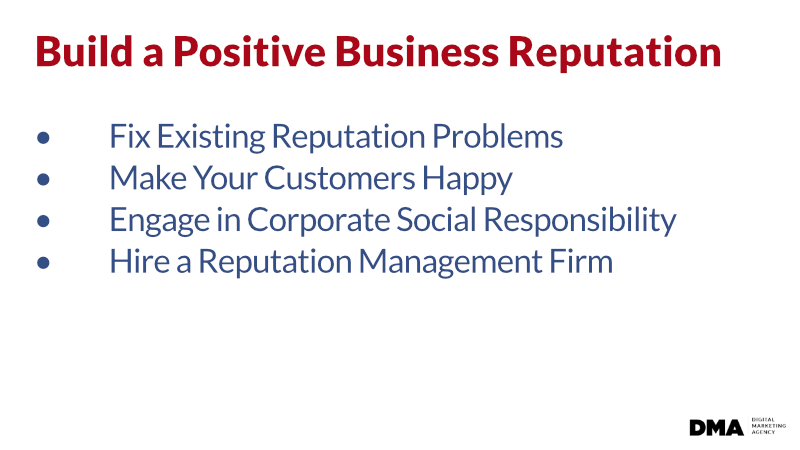SEO
Free SEO Analysis
SEO Services
Content Marketing Services
Local SEO
Link Building Services
Specialized SEO Services
PPC
REPUTATION MANAGEMENT
Free Reputation Management Analysis
Reputation Management Services
Review Management Services
Specialized Reputation Management Services
CEO Reputation Management
Brand Enhancement
Business and Directory Listings
Comprehensive Reputation Management Audit
SOCIAL MEDIA
Free Social Media Analysis
Specialized Social Services
WEB DEVELOPMENT
Free Website Analysis
Web Design Services
Mobile Development Services
Website Maintenance Services
Specialized Development Services
MARKETING AUTOMATION
Free Marketing Automation Analysis
Specialized Marketing Automation Services
Comprehensive Marketing Automation
INDUSTRIES
ABOUT DMA
Reputation Management
Why an Indestructible Online Reputation is Vital to Your Business
Request a quote
Its Fast, Easy & Free
Executive Summary
- Unhappy customers costed businesses more than $75 billion in 2018
- When you respond to negative reviews from a place of trying to understand and fix the problem, it helps you regain trust with your customers and potential customers.
- 94% of people have said they won’t buy from a business that has negative reviews.
Creating a good business reputation doesn’t happen overnight. It takes time and effort.
And it can disappear in a moment.
What does it mean to have a strong business reputation? How do you build one? And, equally important, how do you keep it?
In this article, we’ll cover:
What a business reputation is
Why reputation management is important
Reputation management statistics
How you can build—and keep!—a great company reputation
What Is a Business Reputation?
Before you can understand why your business reputation is so important, and how it relates to your business’s performance, you first need to know what a business reputation is.
Business reputation refers to the generally held beliefs and opinions about your brand, company, products, and services.
A company builds and maintains its reputation through various means, including social media, reviews, word-of-mouth marketing, and even search engines.
Why Is Reputation Management Important?

Did you know that unhappy customers costs businesses more than $75 billion in 2018?
Business is just harder to do when your company’s reputation is bad. A bad reputation can impact everything your business does from employee turnover to customer churn to your customer acquisition costs.
This can leave you with high operating costs, devalue stock prices, and low margins.
And a bad business reputation can start with just about anything: poor customer service, bad reviews, a corporate scandal.
Before we jump into some telling business reputation statistics, let’s take a closer look at a few of the key factors and outcomes that can affect your business reputation and what that means to your brand.
Building Trust & Credibility
You’re going to get a bad review one day. It’s inevitable. You can’t possibly keep everyone 100% happy 100% of the time.
How you respond to that review (or don’t) will go a long way in shaping your business’s reputation.
And your reputation is vital to maintaining a strong business. It’s not enough to just have customers. You need customers that trust you.
Why?
Your business and customers don’t exist in a vacuum. Customers talk to friends and family about their experiences. That means the news will travel fast if they have a problem with you, your products, or your services.
Companies with better reputations are just seen as more trustworthy and credible than its competitors.
This holds true even if your prices are a bit higher than those of your competitors with a reputation that isn’t as strong. People are willing to spend money with businesses they trust.
People research everything online these days and if they see that your company has a handful of unaddressed negative reviews, it’s going to be a red flag.
And they won’t want to do business with you.
When you respond to negative reviews from a place of trying to understand and fix the problem, it helps you regain trust with your customers and potential customers.
Addressing concerns signals to your audience that you value their feedback and want to improve their experience.
Hiring and Retention
Job seekers (the ones you want working for you, anyway) want to work for businesses that have good reputations. The stronger your reputation, the higher quality of talent you’ll attract. And your employees are what keep your business in motion and successful.
This means that you not only have to review and address customer reviews of your business, but you also need to make sure that reviews on employee-focused sites like Glassdoor are largely positive, too.
A bad business reputation will absolutely impact the quality of talent you’re able to attract to work with you, and the best candidates are doing their research.
This has a snowball effect.
Missing out on hiring the top talent leads to productivity issues and lost revenue as your competitors with better reputations snap up qualified staff.
In a survey by Corporate Responsibility Magazine, they found that 76% of people aren’t likely to accept a job offer from your company if you have a bad reputation. Even if the candidate is currently unemployed.
Think about that.
More than three-fourths of job candidates would rather not have a job at all than have a job at a company with a poor reputation.
Of those surveyed, half said they would accept a job offer from a company with a bad reputation, but they’d need to get paid a lot more to do it.
A bad reputation also puts your company at risk for losing existing employees since 93% of survey respondents indicated that they’d leave their current position for one at a company with a better reputation.
This results in increasing hiring, onboarding, and retention costs.
LinkedIn found that the cost per hire is more than two times lower for companies that have a strong reputation. They also enjoy 28% lower turnover rates.
A strong brand reputation is key in attracting and keeping the top talent.
Professional Image
In addition to employees and potential employees, you’ll also need to defend your company’s reputation against banks, potential investors, other businesses, and the general public.
These people can find out anything about your company with a simple Google search and a bad reputation can do immense hard to your professional image.
A strong business reputation is a marketing tool your company can use to its advantage. By taking the time to maintain a good reputation, you won’t need to take the time to convince potential customers or investors that your business is a good bet.
Moz found that businesses risk losing 22% of business when potential customers find negative information about that business on the first page of search results. Three negative articles? That number increases to 59%. If there are four or more negative articles on the first page of search results, you could lose up to 70% of your business.
According to a study by Harvard University, for every one-star increase in Yelp review rating, restaurants realised up to a 9% increase in revenue. This could mean lost sales of $180,000 for a three-star business earning more than $1 million annually as compared to a five-star business.
And, now, this doesn’t just impact restaurants.
94% of people have said they won’t buy from a business that has negative reviews.
Lost Revenue
As you can see from the previous examples, a bad business reputation can lead to lost revenue through lost sales or decreased productivity.
If you’re not sure what people think of your business, you’re not putting yourself in the position to do anything about it.
This means you might miss out on the chance to not only make sales but to make your products or services better.
This compounds over time if it’s not addressed.
Reputation Management Statistics

Here are reputation management statistics that illustrate why your business reputation is important.
United Airlines
after singer/songwriter Dave Carroll put his song “United Breaks Guitars” up on YouTube and it went viral.
Unhappy customers cost businesses
in 2018.
It costs
to attract a new customer than to keep an existing one.
For every one-star increase in Yelp rating, restaurants see a
in revenue.
94% of customers will not buy from a business with negative reviews (ReviewTracker)
Having a 5-star rating earns a business
from Google local results than having a 1-star rating.
Going from a 3-star rating to a 5-star rating gets a business 25% more clicks from Google’s local pack.
Online reputation is rated as
than the company’s mission, insurance benefits, vacation and personal time off, and retirement savings programs.
How to Build a Positive Company Reputation

By now, you should have a great understanding of the importance of a positive company reputation and the monetary impact it can have on your business.
Now, let’s take a look at some ways you can build or improve your company’s reputation.
Fix Existing Reputation Problems
For starters, you need to address, understand, and fix existing reputation problems. Any attempt to improve your company’s reputation can look disingenuous if you’re not taking steps to fix what led to your poor reputation in the first place.
Fixing a negative business reputation means you’ll need to directly address any negative comments and reviews you’ve gotten on rating websites and employer reputation sites.
But don’t just respond to the negative comments. Really think about how you can fix the problems.
While you’re addressing existing problems with your reputation, it’s fine to point out what you’re doing right.
But you can’t do this in a way that feels dismissive of the existing concerns with your business image.
You can share positive stories and wins your business has enjoyed while still acknowledging and addressing the problems.
Make Your Customers Happy
Keeping your customers happy is hands down the easiest way to improve your business’s reputation.
The best way to keep customers happy? Great customer service.
You can use outstanding customer service to keep existing customers from leaving negative reviews by addressing and solving their issues quickly.
We also recommend encouraging your happy customers to leave reviews.
Great customer experience can help you build a great business reputation.
Corporate Social Responsibility
Investing in corporate social responsibility can be a great way to build a positive brand reputation after you’ve fixed any existing reputation problems.
What is corporate social responsibility (CSR)? It’s an actual business model that helps companies be socially accountable. It’s sometimes called corporate citizenship.
Practicing CSR means that your company is conscious of the environment, social, and economic impact it has on society. This means that your business is operating in a manner that brings benefits to society instead of contributing to its negative effects.
Corporate social responsibility sends the message that your company cares about the impact it has on the world and wants to make a positive difference. CSR can help your business recruit high-quality employees and positively influence customers and investors.
Hire a Reputation Management Firm
Improving, building, and maintain a positive business reputation is a lot of hard work. You need to remove negative reviews and content, get more positive reviews and mentions, and potentially handle a PR crisis.
Do you have time for that in addition to running your business?
Many business owners and executives simply don’t. So they bring someone onto their staff.
But, hiring a reputation management firm provides several benefits to your company:
Reducing risk
Increased trust
Better talent
Increased revenue
You don’t need to hire more staff to handle your company’s reputation when you can hire reputation management experts.
Protect Your Business Reputation
A good business reputation makes you more trusted and potential customers are more willing to buy from those they trust. It also can result in increased customer retention and can help you turn more customers into brand advocates.
Your company reputation is your most important asset. The best way to protect your online business reputation is by hiring a reputation management company that understands the unique needs of your business.
Our Sales team